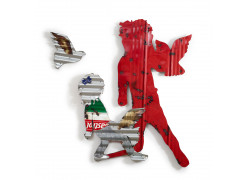Additional info:
Abdul Rahman Katanani is a contemporary visual artist. Katanani is a third generation Palestinian refugee, born in the Sabra refugee camp to the children of survivors of the 1948 Nakba. From age eight through college, Katanani assisted his father, a carpenter, in installing corrugated zinc-metal roofs on concrete structures in the camp. Corrugated metal, among other found materials collected from the refugee camp––pre-used garments, kitchen utensils, barbed wire, pieces of wood, oil barrels––became signatures of Katanani’s assemblage installation art. The materials carry an allegory of the artist’s experiences, and more broadly the experiences of displaced persons. The question of Palestine is omnipresent in his work, as he tackles themes related to borders, trespassing, and freedom. While studying at the School of Fine Arts at the Lebanese University, he developed his visual language explored in his complex body of work. He received his diploma in 2007 and an MFA in 2012 on Palestinian contemporary art. He went on to perform several artist residencies at the renowned La Cite des Arts in Paris in 2012, 2013 and 2016 which further shaped his practice. Today, he is internationally recognized and he has been granted French nationality in honor of his genius and talent. Several solo exhibitions have been organized for his work in Abu Dhabi, Beirut, Paris, London, Kuala Lumpur, Doha, Brussels, Rome, Geneva, Manama, Marseilles, Munich, and Washington DC. In 2013, French writer and filmmaker Christophe Donner produced a feature film, entitled Le Lanceur de Pierres, based on Katanani. He was nominated for the commitment prize at YIA Art Fair in Paris in 2016, and then in 2008 and 2009 he received prizes from the Sursock Museum in Beirut. Since 2019, Katanani has lived between Paris and Beirut.
-
Teodor Graur
b. Pogăceaua, Romania, 1953 -
Viorel Mărginean
Cenade, Romania, 1933 - Bucharest, Romania, 2022 -
Elie Kanaan
Beirut, Lebanon, 1926 - Beirut, Lebanon, 2009 -
Daniele Genadry
b. 1980 -
Remo Squillantini
Stia, Italy, 1920 - Florence, Italy, 1996

